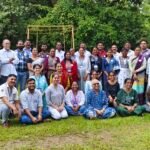Priya Ahluwalia
COUNSELOR
22-year-old Varalika (name changed) was rescued from commercial sexual exploitation a few years ago when she was a child. She had been placed in a child care institution for a few months before being restored to her family. Prerana was referred her case when she was at the child care institution. In 2019, Prerana initiated family strengthening and outreach psychosocial services with her and her family.
During the sessions, Varalika has often expressed a desire to be able to overcome her trauma. In her case, it has been observed that while her family has been supportive, her friends in the community are not helpful. In fact, sometimes their insensitive comments added to her distress. In a recent session, Varalika shared one such incident with the counselor. She shared that one of her friends had recently misunderstood her interaction with her husband, and used Varalika’s past to humiliate her. Her friend had accused her of trying to ‘seduce’ her husband as this was her ‘Dhanda’(business). Varalika shared that she felt angry and humiliated, but the shock from the allegations was so intense that she could not defend herself or clarify. Although she fondly recalled her mother defending her fiercely, she felt guilty for not being able to speak for herself. The incident also triggered memories from her time in the institution where such language was often used by the residents, during any conflict. Varalika’s story highlighted that when it came to processing trauma, time may not always prove to be a healer. Some triggers could still lead to a trauma response irrespective of the passage of time.
Varalika had felt helpless when she heard the accusations being made by her friend and was wondering if there was something ‘wrong’ with her not having responded to the situation. As caseworkers and counselors working with victims of trauma, we have to constantly endeavor to externalize this blame and guilt. It is important to acknowledge that the client’s feelings are valid but also help them understand that they were not at fault in such situations. It is incorrect to presume that victims of trauma may have reprocessed the feelings associated with the traumatic incident because of the passage of time or change in circumstances.
In Varalika’s case, we also observed that her parents were a big source of strength for her. She found support when her mother immediately stood up for her and later when her parents comforted her as she felt overwhelmed. Her parents assured her that she was not in the wrong and encouraged her to not believe the false claims made by others. Family and community strengthening is essential in the rehabilitation of a victim. As caseworkers and counselors working in the community, we must work to strengthen the family’s understanding of trauma and trauma responses. It is important to equip the family with essential skills to validate the victims’ struggle and stabilize them in such situations.









